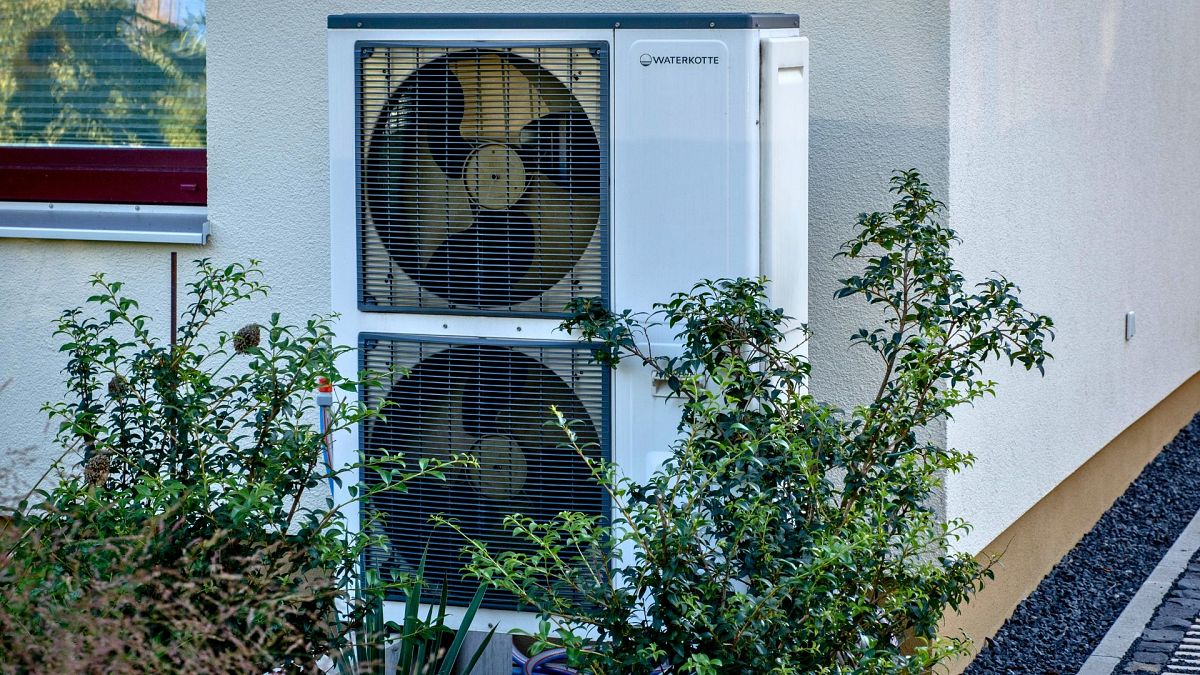In these days when winter is in full swing, your eye-watering energy bills may lead you to alternative heating methods.
Heat pumps promise lower emissions and potentially lower costs. With many European countries offering subsidies for the installation of green technology, is it time to make the switch?
In a recent study, scientists at the University of Cambridge in the UK recommend making a careful cost assessment before saying goodbye to your gas boiler.
They found that heating demand could increase by up to 20 percent after switching to an air source heat pump.
Euronews Green spoke to report co-author Dr Ray Galvin to find out how this could affect your energy bills.
How can a heat pump increase your heating demand?
Because heat pumps operate at a much lower temperature than gas boilers (around 55C compared to 65-75C), it takes longer to heat a room.
This often means that households need to change their heating schedules when switching to a heating system. Heat pumpachieving the same comfort as before by allowing more time to warm up or maintaining a constant ‘setback’ temperature.
This can increase your overall heating demand by 5 to 20 percent. to workIt was published in the peer-reviewed journal Energy and Buildings.
Demand will be greater in homes that are only heated for short periods of time during the day. Homes with poor insulation and low thermal mass (meaning they cool down more quickly) will need more. heatingsuch as in places with cold winters.
There are other costs to consider as well. The lower operating temperature of heat pumps means larger radiators are needed to feel their benefits. Therefore, sometimes you may need to replace your radiators when installing a heat pump.
It’s also important to consider your hot water supply when installing a heat pump. You may also need to install a hot water cylinder as they cannot provide hot water when you want it.
How energy efficient does your home need to be to make a heat pump worthwhile?
It is possible to predict an increase in demand based on your heating pattern, local weather and the condition of your home. energy efficiencyresearchers say.
Some studies say that almost any home can run on a heat pump. But Dr Galvin says more energy-efficient homes will have lower running costs.
Your home’s estimated annual heating demand can help you decide whether a heat pump is a good investment.
This can be found on your home’s energy performance certificate (EPC) and is measured in kilowatt-hours (kWh) per square meter per year. You can also check your bills to see how many kWh you are using per square metre, but you will need to subtract fixed charges.
A house estimated to consume 70 kWh of energy with its existing gas boiler system is likely to have simple but effective double glazing, suitable cavity walls or external walls. insulationand reasonable insulation in the attic and below ground.
Dr Galvin says that in homes of this standard, a heat pump will usually operate efficiently enough to make it worthwhile.
However, since the heating requirement stated on your EPC is for your old heating system, it does not necessarily provide an accurate estimate of your heating needs with a heat pump.
Knowing heat loss and thermal mass HouseWe can help with the last of these points, but this information is not currently included in home energy performance certificates.
The researchers propose that these factors, in addition to the space heating requirement already included, be added to EPCs. This will allow for accurate assessments. energyMaking the demand before the heat pump is installed, rather than operating under the assumption that demand will remain the same.
A projected large increase in energy demand can be reduced by improving the climatic conditions of a building. insulationand air sealing to reduce heat loss.
As a side note, don’t forget this insulated Houses should be ventilated regularly. Dr Galvin recommends “shock ventilation”: opening all windows for a few minutes in the morning and again in the afternoon. This allows air exchange without giving the walls too much time to cool and losing the benefit of heating.
How to maintain a comfortable temperature with a heat pump?
In terms of comfort, the lower temperature of heat pumps doesn’t necessarily have a big impact if you have regular heating needs; For example, you can set a timer for when you wake up in the morning and when you return home in the evening.
But if you need heatingYou will occasionally find that you have to wait longer for the room to heat up.
“In some cases, constantly running the heating at too low a level may produce a hissing sound.” winter During the day, says Dr Galvin. He recommends actively testing different heating models to find the best balance between comfort and consumption.
He adds that in some cases it can be useful to use a small infrared heaterWith a timer to quickly heat the room when necessary to compensate for the delay of the heat pump.
Are heat pumps cheaper to run than gas boilers?
Heat pumps run on electricity instead of gas. In Europe, the price difference between the two is huge.
Inside England Gas currently costs around £0.07 (€0.08) per kWh, while electricity costs around £0.28 (€0.33) per kWh. This is partly because electricity is subject to a carbon tax, whereas gas used for heating is not. Policy costs such as tackling fuel poverty and promoting renewable energy are also often added to electricity bills.
Similarly, in the EU, gas is currently 0.08 euros and electricity is almost 0.29 euros.
Actually, heat pumps Because heat is transferred rather than produced, it can be three times more efficient than gas boilers. Despite this, the huge price difference between gas and electricity means that they are not always cheaper.
if the price electric Dr Galvin explained that if gas were only three times the cost, heat pumps would be roughly cost neutral. While this may not be the case now, installing a heat pump now can still feel hectic.
“There is a gap between the cost of running a boiler and the cost of running a heat pump,” he says. “But if you’re sensitive about how you do it, it’s not a big deal. And it may actually change in the future.
However, some experts recommend being even more careful. Dr. from the Regulatory Assistance Project (RAP), an NGO that consults on energy and air quality. Although there are many factors to consider, “ideally electricity/gas prices should be close to 2.5, or even better two,” says Jan Rosenow. “This way, in most cases, the heat pump will hiss to shut down.”
But like Dr Galvin, he now refrains from advising against heat pump installation.
“With a very efficient system plus special tariffs you can save a lot of money with a heat pump even today.”
Need to install a heat pump now?
While we haven’t quite reached cost neutrality on heat pumps in terms of pricing, “We just need to: decarbonize”says Dr. Galvin.
In rules published this month to improve the energy performance of buildings, the EU made it clear that we need to switch from gas to electricity and has prepared plans to do so. decarbonization grill. Dr Galvin says this is “a big challenge that needs to happen and needs to go along with the transition to heat pumps, to electric vehicles”.
EU’s Energy Performance in Buildings Directive calls for the complete phase-out of electric boilers fossil fuelsBy 2040.
This may make heat pumps necessary, even mandatory, in some countries; so installing one now probably won’t work in the long run. It will also protect you from increases in gas prices.
“If you’ve got the money upfront, I’d say it’s probably best to switch sooner rather than later,” says Dr. Galvin.
He points out that if the new rules come into force, there may be a sudden increase in demand for heat pumps. famineNumber of future installers.
Should you install solar panels to power your heat pump?
In the ideal world, Dr Galvin also recommends installing the following: solar panelsTo provide clean, cheap electricity to your heat pump.
It refutes the claim that the two forms of green technology are seasonally incompatible, with heat pumps needed most in the winter and solar panels providing the most energy in the summer.
“There’s actually a huge season on both sides where sunshine makes a difference,” he says.
Through extensive modeling he showed that: photovoltaic As long as the panels are of optimum size, they are effective in reducing the operating cost of the heat pump. He estimates 3 kW is enough for a three-bedroom house.
“70 kilowatt hours, plus a heat pump and photovoltaics… is the most economical solution you can get,” he says.
Many countries offer grants and subsidies to help with this problem. transitionThe UK recently increased its air source heat pump grant from £5,000 to £7,500.
But, GermanyIt backtracked on heat pump subsidies this month as it tackles its deficit, suggesting green grants are often the first targets of cuts.


 Behind the scenes of Morocco’s most famous golf tournament, Hassan II Trophy
Behind the scenes of Morocco’s most famous golf tournament, Hassan II Trophy Lynyrd Skynyrd’s Gary Rossington dies – What other bands have no surviving founding members?
Lynyrd Skynyrd’s Gary Rossington dies – What other bands have no surviving founding members? Where are the most financially literate people in Europe?
Where are the most financially literate people in Europe? Free and open Indo-Pacific
Free and open Indo-Pacific ‘The enemy is misinformation’: World leaders, businesses discuss cybersecurity in Riyadh
‘The enemy is misinformation’: World leaders, businesses discuss cybersecurity in Riyadh Digitization and new technology to help regenerate rural areas in Japan
Digitization and new technology to help regenerate rural areas in Japan The Magnificent Blue Moon: What is it and where are the best places to see in Europe?
The Magnificent Blue Moon: What is it and where are the best places to see in Europe?